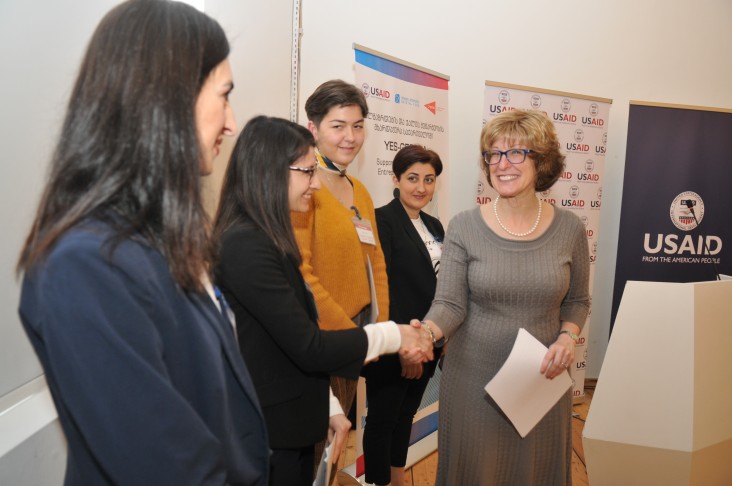Speeches Shim

In Europe and Eurasia and around the world, USAID and the White House-led W-GDP Initiative empowers women to start and scale their businesses.
Worldwide, women entrepreneurs are an emerging market force and an important source of innovation and job creation. Yet they often do not have equal access to the capital and business networks they need. The COVID-19 pandemic has demonstrated how critical advancing economic opportunities for women remains – now more than ever, we need to empower women as workers and entrepreneurs.
The White House-led Women’s Global Development and Prosperity (W-GDP) Initiative is the first-ever, whole-of-government approach focused on advancing women’s full participation in the economy. W-GDP includes an innovative fund, now in its second year, totaling $200 million and working across more than 60 countries.
In Georgia, a former Soviet Republic that has been independent since 1991, USAID’s Supporting Youth and Women Entrepreneurship in Georgia program is partnering with nonprofit Crystal Fund to help young people start and expand their own businesses. Since launching in 2015, the project has helped more than 2,000 women start and expand businesses. With W-GDP support and private sector investment, the project expanded and by 2024 aims to support an additional 2,500 female entrepreneurs up to the age of 50 with financing and business training.
Meet three of these entrepreneurs who, with W-GDP support, have gained valuable skills, made connections, successfully applied for financing, and expanded their businesses. Now they are facing the challenge of COVID-19 head on and setting an example for Georgia’s next generation of entrepreneurs.
Malo’s Handicrafts
Malo Kotua, an artist specializing in handicrafts, does not take independence for granted. Malo’s community has struggled with the aftermath of a separatist conflict in the early 1990s and Russia’s deepening occupation of the territory of Abkhazia, including Malo’s hometown of Gali. This occupation has hampered economic growth in Abkhazia, which has largely been cut off from the development successes achieved across much of Georgia over the past two decades.
Malo is driven to succeed despite these difficulties. She opened her business, Malo Handmade, in Zugdidi on the Tbilisi-controlled side of the Administrative Boundary Line, where she commutes several times per week. While the distance is only 30 minutes by car, the nearest crossing is regularly closed by the de facto authorities in Abkhazia.
With W-GDP-funded mentorship and financial advice, she bought new equipment, increased production, and opened a second art studio near her home in Gali. Now, Malo Handmade sells bags, accessories, jewelry, and kitchenware across Georgia. Malo hopes to one day export her products abroad.
Malo gives back to her community by teaching handicrafts. “I am extremely delighted to share my knowledge with other women and children, especially ones who are affected by the political and economic turbulence of the region,” she said.
The pandemic has made business more difficult, but Malo adapted and now accepts orders online and delivers products through the mail, becoming one of many Georgian entrepreneurs who have weathered the crisis by moving to a more flexible business model.
Beekeeping with Ana
In Georgia, beekeeping is a male-dominated field. For Ana Kopadze, beekeeping is the family business. A student and entrepreneur from the town of Khashuri, Ana learned the art of beekeeping from her grandfather, Zakaria.
“As a child, I often accompanied my grandfather to the beehive,” she recalled. “He showed me everything in detail. How bees work, how the honey is extracted.”
Ana’s childhood passion became a business in 2018 when she attended USAID’s Young Entrepreneurs School. The youngest participant in her cohort, she later submitted a successful business proposal and received startup financing. Ana expanded her family’s existing operation, purchasing 10 beehives and registering the company as Zakaria’s Honey.
Now, business is booming. Zakaria’s Honey produces 440 pounds of natural honey each year, as well as candles made from beeswax. With hard work and ongoing mentorship from W-GDP, Ana has continued to move forward during the economic disruption caused by COVID-19. The business has delivered two successful harvests in 2020, and Ana is looking to expand production.
Rena’s Language School
Rena Ajalova, a linguist and entrepreneur, started a language school in the city of Marneuli, an ethnic Azerbaijani enclave within Georgia. Most residents there don’t speak Georgian, which excludes them from national political and economic life. “I thought that opening a language school would help them,” she said.
Rena attended the Young Entrepreneurs’ School in 2016 and the following year USAID helped her receive financing to open Lingua, a school teaching Georgian and English languages. She used the money to purchase computers and furniture, and the U.S. Embassy in Georgia donated textbooks.
“We distributed flyers and in two days had our first client, a woman named Farida who wanted to take English courses,” Rena said.
W-GDP supported Rena in growing her business, and three years later, Lingua is profitable. More than 150 people have graduated from her language courses, the majority of whom are ethnic Azerbaijanis. They can now better participate in civic activities and are more competitive on the labor market.
COVID-19 posed a problem, but Rena did what she always has: found creative ways to meet the needs of her community. She moved her lessons online, where students continue to learn valuable skills.
In Georgia and around the world, W-GDP will continue to support efforts to help women start and scale up their businesses and achieve prosperity and stability. When women succeed, communities prosper and societies move forward.

Comment
Make a general inquiry or suggest an improvement.